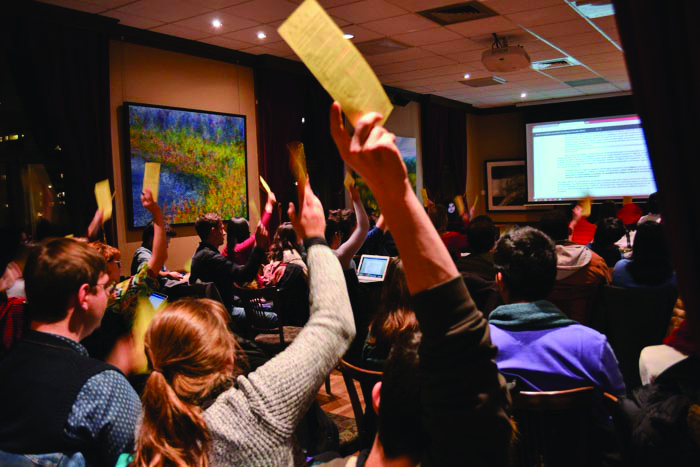Executives and commissioners working at the Post-Graduate Students’ Society of McGill University (PGSS) have reported an intense workload and excessive hours. On several occasions, executives have had to work nearly double the hours required of their positions without overtime pay. Inadequate graduate funding, staff shortages, and limited time-frames for recruiting students for governance committee roles have all contributed to executives being overworked.
In a November 2022 executive report presented to the PGSS Council, PGSS Secretary-General Kristi Kouchakji detailed that between Oct. 12 and Nov. 12, she logged a total of over 80 hours of work. She is paid to work 12 hours per week yet often works 15 to 18 hours, leaving Kouchakji feeling burnt out. She also believes that a culture of overwork has been ingrained at McGill, leading to higher expectations for those filling positions like that of Secretary General.
“Sec-Gens have leaned so hard into doing as much as they can of everything that the structural issues have gone unaddressed, and in the process, it has trained certain university committee chairs and admins to straight up expect Sec-Gens and [University Affairs Officers] to work unlimited hours, to sit on all the committees, and meet every last-minute demand thrown at them, which has made the problem worse,” Kouchakji wrote in an email to The McGill Tribune.
According to Kouchakji, McGill’s overall lack of graduate funding has exacerbated labour issues at PGSS. Because many graduate students have to take on additional external employment so that they can afford to live, they have less time to sit on different PGSS committees for no pay. The responsibility for sitting on committees is thus left to PGSS executives.
“[Graduate students are] understandably more selective about how they do use any small bits of time they might have,” Kouchakji wrote. “You’re not going to take on a bunch of volunteer work for the institution that put you in that position.”
Hossein Poorhemati, PGSS’s University Affairs Officer, also believes the lack of volunteers is putting more strain on executives. He told the Tribune that the issue is compounded because McGill gives PGSS a narrow window of time to recruit.
“We need people to represent us, but we don’t have enough students stepping up as volunteers, and we don’t have enough time to recruit. It takes us four to six weeks to process applications, yet often we receive emails from admins announcing a position that needs to be filled in two weeks,” Poorhemati said. “As a result, we have had to look around to see if any of our executives and commissioners can go and attend these meetings. That is where the problem starts.”
Poorhemati feels that earlier notices from the administration about recruiting committee representatives and additional information on what each position entails would help alleviate some of the burden faced by executives.
Overwork is also a problem at the Students’ Society of McGill University (SSMU). Kerry Yang, SSMU’s vice-president University Affairs, told the Tribune that executives often work overtime. Yang explained that balancing schoolwork with a full-time job is challenging and often unsustainable in the long run, especially for international students who are required to take a full course load.
“Executives work from 9 a.m. to 5 p.m., but because many casual staff and students have classes during that time, we often have to schedule meetings or host events outside working hours, which can really stack up the hours,” Yang wrote in an email to the Tribune.
This overwork has taken a significant toll on both the personal and academic lives of SSMU and PGSS executives. According to Kouchakji, PGSS has lost several executives due to the pressures that come with the job and their inability to keep up with coursework and research commitments.








